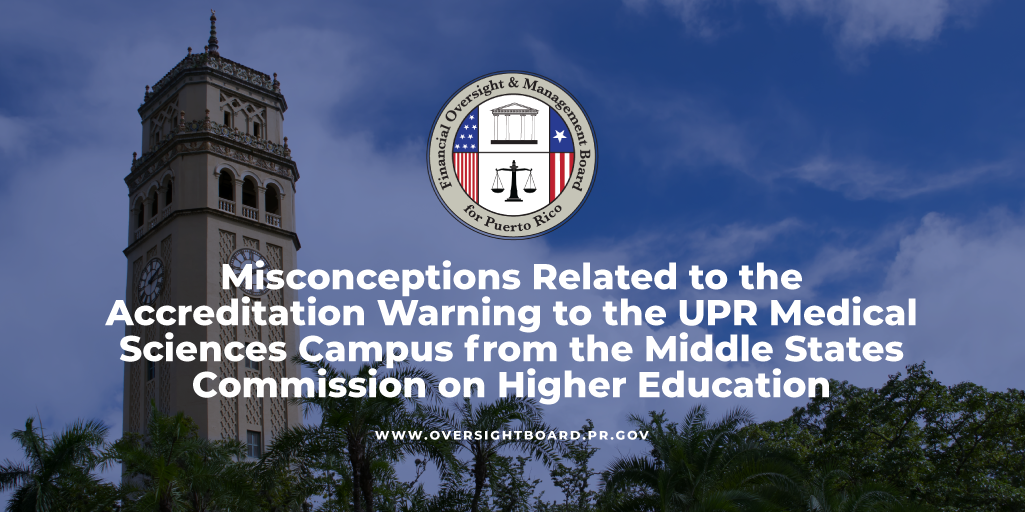The UPR is a center of academic excellence and a source of pride for all Puerto Ricans. UPR will undoubtedly play an essential role in PR’s recovery and its future.
Yet, UPR is facing significant challenges, including a bloated cost structure that finances an outdated bureaucracy rather than investing academic excellence and student life. The accreditation warning the Medical Sciences Campus (UPR-MSC) received from the Middle States Commission on Higher Education (MSCHE) is an example of both UPR’s challenges and its financial mismanagement.
The accreditation warning from MSCHE requires UPR-MSC to demonstrate financial sustainability, a goal entirely consistent with the purposes of PROMESA and the efforts of the FOMB.
The FOMB must, then, address several incorrect and unsubstantiated assertions by UPR-MSC in its 2020-2021Self-Study Report (Report). First, the FOMB does not make campus-level budgeting decisions for UPR. Specific funding requests are handled through UPR’s internal budgeting process. Second, UPR incorrectly asserts that UPR-MSC is underfunded.
Although UPR‑MSC projected a $7M budget deficit for the current fiscal year of 2022, UPR‑MSC acknowledges the government allocated an additional $10 million in funding—leading to a $3M budget surplus. Indeed, according to the Report, UPR-MSC anticipated budget surpluses of $9.3M in fiscal year 2020, $9.7M in FY2021, and $4.2M in FY2022. Given these projected surpluses, UPR-MSC’s claims of underfunding lack any basis in fact appears more than adequate.
UPR-MSC says it requires $6.9M to maintain faculty positions for accreditation. If the UPR administration concludes these faculty positions are necessary, the FOMB trusts that UPR will allocate funding for those positions in UPR-MSC’s budget for the upcoming fiscal year 2023.
The FOMB is concerned that the MSCHE’s warning letter reflects a broader failure within UPR to accurately project budgetary needs and effectively manage existing UPR resources. UPR’s many problems and challenges are not solved by increasing funding. Instead, UPR must develop and implement a process for making fiscally responsible internal funding projections and allocations. If UPR had done so, it is unlikely it would have received a warning from MSCHE.
UPR has failed to manage its finances in other ways, as well. For example, UPR has failed to collect outstanding monies owed to UPR-MSC. According to the Report, the Government of PR owes UPR-MSC for services rendered between 2003‑2015. UPR-MSC failed to collect the entire amount because of poor billing processes and lack of aggressive collection efforts, forcing UPR-MSC to write-off $79M. Notwithstanding such failures, the Oversight Board assisted UPR in collecting approximately $49M.
UPR’s response to the accreditation warnings, including its letters to the FOMB, show fundamental failure to accept responsibility and accountability. The students and the residents of PR deserve better.





